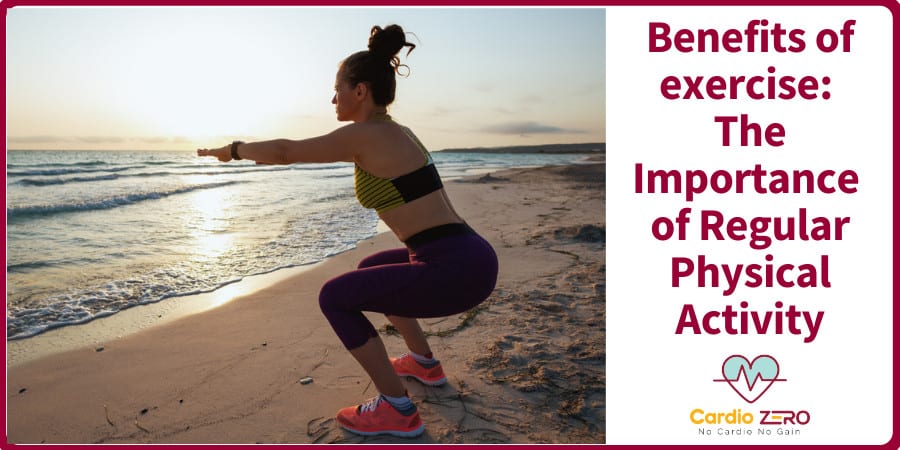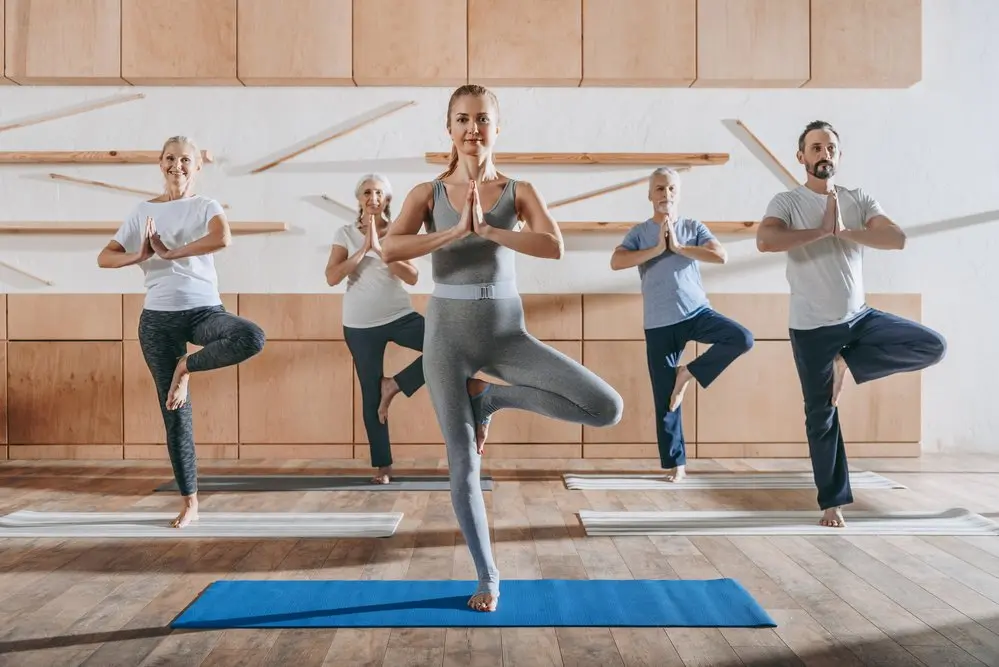Working out is an excellent way to feel great, cut medical expenses and achieve other goals in your life.
In this article, we’ll discuss the physical, mental, social, and economic Benefits of exercise: The importance of regular physical activity.
Finally, we’ll provide bonus fitness tips in our “Did you know section”. Enjoy!
Physical Benefits

1. Health
The health benefits of a regular fitness routine are countless. In fact, it may completely transform your body. We’ll look at how regular fitness impacts the following parts of your body:
-
Cardiovascular System
Regular exercise in conjunction with healthy eating, lowers the level of bad cholesterol. This improves blood flow and the integrity of your blood vessels.
Cardio along with weight lifting enhance your cardiovascular endurance. This strengthens heart muscles. The result is lower blood pressure and better capacity to complete tasks.
Regular exercise also triggers the production of more red blood cells. This is in a bid to increase the amount of oxygen molecules delivered to working muscles. You’ll notice improved stamina as you repeatedly tackle hard workout days.
-
The Brain
Regular exercise helps to boost the amount of oxygen supplied to the brain. This boosts cognitive performance. Some of the areas of change include memory and information processing.
Exercise also helps lower the levels of cortisol, the stress hormone. Regular exercise has also been shown to increase the number of new neurons.
This leads to a physical change in the wiring of your brain. This allows you to have better memory, processing speed and perspective of information.
-
The Lungs
Regular exercise continuously increase your oxygen requirements. This leads to an increase in your lung capacity.
This progressive overload strengthens your lungs and the diaphragm. It also increases its oxygen-assimilating efficiency.
The obvious benefits of this include higher payload capacities and energy levels.
-
Muscles
Regular exercise expose your muscles to stress. This can be due to fatigue or micro-tears in the muscle tissues. To recover, your muscles use protein and energy to repair torn cells.
This process increases the size of the muscle. This is how muscles grow. Larger muscles mean more strength to do more exercise. The pattern repeats.
You’ll notice an increase in your strength and endurance levels. This can be useful in advancing your fitness level. It also increases your basal metabolic rate and caloric requirements.
The result is better caloric expenditure. Therefore, you can burn more fat to feed the muscles. You get leaner and stronger.
-
Kidneys
Regular exercise has been shown to cause significant transformation in the urinal system. Significant transformations have been observed in the renal hemodynamics.
It also impacts the electrolyte and protein excretion. This is because fitness can keep you free of obesity, high cholesterol levels and diabetes.
These are all complications that may stress the kidneys.
-
Motor Functions
Performing regular fitness activities can improve your eye-limb coordination. This can be useful in improving your reaction times.
As such, you can play challenging sports such as squash, baseball and table tennis. You also become more agile and an overall better athletes.
This is why pro athletes spend tens of hours working out every week.
-
Hormonal Systems
Hormones arguably play the most important role in the body. They dictate what happens where and when. A lot of complications in the human body can be traced back to an instance of hormonal imbalance.
For instance, diabetes is caused by insulin imbalance. Exercising regularly can help stabilize the hormonal system. The result is better health and well-being.
2. Appearance
A day becomes interesting then you push it to the next. And weeks, months, years later, you have gradually transformed your body to its genetic best! It’s a slow but sure process.
Provided you make it a routine. You’ll look much better in most outfits, especially at the beach. You may even try clothes you’ve never thought would look good on you!
Another benefit is boosting your non-verbal and verbal confidence when interacting with your environment. Ever heard of glowing after cardio or just about any kind of intensive “workout”.
You’ll love yourself more(in the mirror) every day you stick to your fitness schedule. This can improve your posture, presence, and tone.
3. Athletics and Sport
As you have already noticed, it’s much harder to complete training routines when you are a newbie.
However, over time, activities that used to scare you slowly become normal, manageable, and even too light. The newly acquired endurance and stamina improve the odds of excelling in any sport.
This may allow you to participate more often and boldly in local games. If all goes well, you may even join professional sports. Discipline is necessary to show up every day for training.
The same value that can make you a reliable, competitive, high-value athlete.
4. Job performance
Regardless of the type of job, regular exercise can help you perform better.
For instance, you can get more stuff done in a relatively short time. You may also clock in more hours than usual. This applies to both computer-based or manual jobs.
One study showed that regular exercise can improve employees’ time management and workload completion rate by up to 72%.
Mental Benefits
Healthy mind healthy body. Regular exercise can greatly impact the following aspects of the brain:
1. Creativity
Regular exercise stimulates the release of brain-derived neurotrophic factor. In turn, this triggers the production of new brain cells in the hippocampus.
This is the area of the brain responsible for memory. It’s also responsible for imaginative thinking. Therefore, regular exercise can drastically increase the number of new, complex thoughts.
A 2014 study by Stanford University confirmed the effectiveness of perambulation. It showed that walking can significantly aid creative efforts such as convergent and divergent thinking.
It further confirmed a greater effect if this was done at least 3 times a week. Some of the highest achieving people in the world are fitness enthusiasts.
Hugh Scott-Douglas, Nathlie Provosty, and Guido van der Werve are some notable artists who find creativity in exercising.
2. Mood
There are several ways in which exercise can impact your mood. For instance, simply leaving the house to go be with people or workout can meet your social needs.
Exercising can also distract you from the natural negative stream of thoughts that attack the human brain. Instead, you will focus more on the task at hand and your overall progress.
Exercise triggers the production of serotonin. This is a compound present in the platelets and serum. It’s a vital neurotransmitter that the brain uses to control mood, anxiety, pain inhibition, and sleep.
More of this stuff makes you feel great in and out. Exercise also limits the effect of stress on your brain.
According to a paper published by Harvard University, exercise increases the levels of endorphins. These are endogenous opioid neuropeptides and peptide hormones that are responsible for making you feel good.
They are released as a reward for the accomplishment of vigorous physical activities. (could be cardio or weight-lifting).
These chemicals also bind with the receptors that dictate your perception of pain in the brain.
This is why you can push through tougher activities the more you exercise. Endorphins have the same pain-masking properties as Morphine.
3. Cognitive Performance
The benefits of exercise on the mind are hard to miss. Moderate-intensity exercise has been shown to improve working memory and cognitive flexibility.
On the other hand, high-intensity exercise has been shown to improve the speed of information processing. This impact is universal to all people, regardless of fitness levels.
Regular exercise has also been linked with normal insulin levels and reduced inflammation. This drastically improves energy levels and the desire to do more.
A meta-analysis of Tai chi showed that it improved the executive thinking in adult fighters.
Low fitness levels have been linked to an elevated risk of dementia and other forms of cognitive impairment.
Social Benefits
The benefits of regular exercise are not to be realized by only you. You should anticipate changes in the following areas of your social circle:
1. Romantic
By exercising regularly, you train your mind to stay committed. This may enable you to actively participate in your romantic relationships.
It’s easier to be present, comfortable, and devoted. Reaching your body goals can also help you build confidence. Consequently, you’ll feel more secure about yourself.
This way you can be bold enough to approach or attract potential partners. You can also strengthen your relationship by exercising together.
This time can be spent acquainting well with your better half. You can also get back your dream body after having children. I can go on and on.
2. Nonromantic
You can easily climb the social ranking within your circle of friends. The fact is most people have trouble exercising regularly. When you beat this norm, people will want to be closer to you.
This affords you the opportunity to share your fitness journey. More and more friends will be reaching out for tips and partnerships.
Another benefit is your social image. This can be both physically and online. People can notice your transformations and tag values to it. You’ll also have something nice for the gram.
I personally don’t advocate for sharing your life online, but, you get the point. Your odds of interacting with people confidently are greatly improved.
Spending more time at the gym also means you get to meet people. Maybe even train with them. This builds your public relations skills.
You may learn a few things about teamwork, courtesy, patience, and generosity. All of these qualities make you a better person.
3. Relatives
Spending time actively exercising can also challenge members of your family to do the same. Your experience will go into good use as you nurture them too. They can also enjoy better health, cognitive performance, and character improvements. This way, you can improve their lifespans.
Jointly exercising with your family can build your bonds. It improves the mood of both the parents and children. Regular participation in physical activities by children at home has been shown to improve their social confidence.
This allows them to perform well in sporting activities in school. It also makes it easier for them to make new friends.
4. Recreational
Physical unfitness is a barrier to even having fun. Regular exercise can increase your cardiovascular endurance. This allows you to engage in extreme sports that you have never tried before. It also allows you to plan group recreational sports.
Physical wellness can also help resolve chronic conditions such as back pain, that may have been hindering you.
5. Public Relations
This is a very important skill for any person. In fact, human beings are social beings. Staying lonely can trigger anxiety and depression. Regular exercise constantly builds your confidence.
This can be due to the physical transformations that allow you to boldly interact with people. You can now make verbal comments at work or chair meetings.
Every completed training day teaches you that you can achieve your goals. The same effect is transmitted to the rest of your life.
Some people have applied and gotten their dream jobs after regular exercise. It can also allow you to adequately fill leadership positions both recreationally and professionally.
Economic Benefits
Discipline, commitment and endurance are three values necessary to excel in both the physical and financial world. By nurturing these values, you put yourself in a position to achieve your financial goals in any of these areas:
1. Professional Sports
A fit individual has higher odds of joining professional sports teams, This can be at any level. Your physical capabilities and experience can assist you to better blend with your team mates.
It also makes it easy for you to never miss training days. Combine this with the confidence we talked about and your sports dreams can come true.
2. Tertiary Paying Services
Regular exercise is a great way to find out what you are good at. Once this is known, you can make the necessary steps to be the best in class.
This becomes easy as you are both physically and psychologically tuned to beat your own limits. In no time, you become a pro!
Do you know what this means?
You may turn fitness into a career. It’s both fun and captivating to consistently work out without fail. You’ll also learn valuable skills and lessons along the way.
These are tools you can use to charge some money for related services. Some of the jobs you may consider include, personal coaching, start a commercial gym, or sell reliable fitness equipment.
Online exercise content creation is also another way to cash in on your regular exercise routine. This includes blogs, tutorials, brochures or videos,
3. Vocational Championships
Your newly acquired “fitness junkie” title can get you great prizes in certain competitions. For instance, marathons. A good example is the New York Marathon’s prize money of $100,000.
There are many other soccer, hockey, tennis, basketball, and swimming competitions that can give you a lot of dollars.
4. Entrepreneurship
During your exercise endeavours, you will identify specific loopholes to fill in the fitness industry. It could be the lack of specific information, equipment, technologies and facilities.
You can then design a concrete approach to solve the problem. This is the most common genesis of most fitness entrepreneurs.
The exercising and wellness space is valued at over $30bn in the US alone. This number is set to grow to over $50bn by 2025.
The industry has expanded to a staggering valuation of over $100bn worldwide.
5. Job Performance
Once you have hit several milestones on your fitness journey, its easier to do the same at work. You may catch the eyes of the management with your increased productivity.
It’s much easier to tread new waters. In this regard, you may attract more responsibilities such as promotions or leadership roles in your team.
Did you know!
You’ll never be too fit
Fitness has no universal definition. I call it the ability to have a healthy relationship with your mind, food and physical activity. This means that as long as your body is there, then, working out is also there.
Your body is a constant processor of food and information until you die. There’ll be fat to burn, a heavier weight to lift, water to drink, sleep, and muscles to build.
The fitness world is too big to explore it all
There are thousands of exercises in the world. Even if you were to workout every waking minute of your life, you can’t exhaust the list. More importantly, you can’t master the proper form for them all.
Therefore, as you set your fitness goals, let them be part of a never-ending, rewarding journey. This is why you are encouraged to lift heavier weights to grow muscles. Fitness is more mental than it is physical, here’s why.
You’ve probably overstrained and here’s why you should stop…
Understanding why you are running that marathon or lifting those weights is more important than the action itself. Your fitness journey must be rooted in a place of logic.
It’s when you have this understanding that discipline is born. Discipline conceives progress. In turn, building your desire to show up and beat your own records, everyday!
As they say, you don’t need motivation, you need discipline.
You can workout, SMART!
I’m assuming you set concrete fitness goals before starting your journey. This could be the amount of fat to burn, toning, mass gain or type and quantity of muscles to build.
Regardless of your desire, there are biological processes that make it happen. Understanding these bio-activities can help you get better results, quicker.
For instance, the form of lifting weight far outweighs the number of reps or sets. You must ensure that each targeted muscle group is REALLY stimulated.
This is why some guys spend a relatively short period at the gym yet, they get better results. Other ways of training smart include deploying drop sets, fuelling up before/during/after workouts and HIIT training.
It all depends on your genetics
Avoid being too ambitious when setting fitness goals. First off, there are a number of factors affecting exercise results that are simply out of your control.
These include age, medical conditions, etc. However, the most powerful of them all is genetics. This is why you should not compare your gains( or fat losses) with others’.
Genetics sets the limit of the results you can get at the gym( from other forms of working out). For instance, men tend to have stubborn fat deposits around the lower abdomen and belly areas.
Other people have trouble metabolising fat while others lose fat fast. Either way, don’t expect too much from yourself.
Managing your expectations can effectively increase your physical performance. This way, you can workout REGULARLY!.
Conclusion
Exercising regularly promotes our physical, mental, social and economic well-being. It also puts you in the position of effecting positive change in your community.
Remember to continuously educate yourself about all matters fitness. This enables you to train smart and get better results.
Did you like this article? Feel free to check out other great fitness content on the site. Thanks for making it to the end. See you on the next one, cheers!



